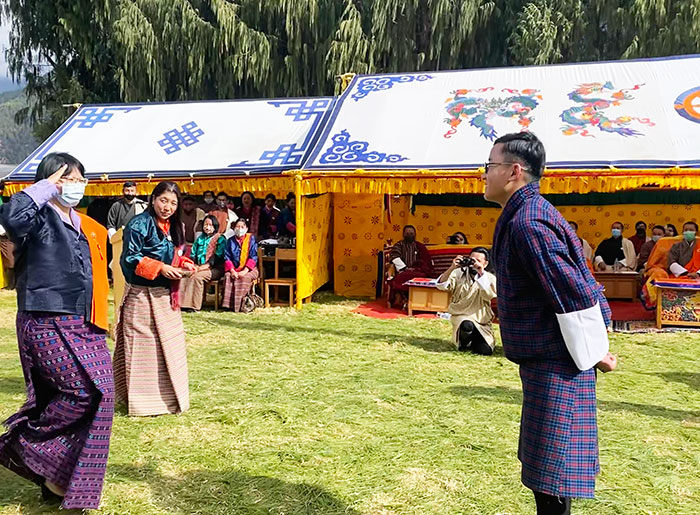
Health minister Dechen Wangmo takes part in a game with students of Wangsel institute for the Deaf in Paro.
Phub Dem | Paro
Dorji Zangmo was not born deaf. When she turned three years, she was severely sick from high fever and sore tongue.
Her parents did not take her to hospital as it was far from her village. She stayed home and gradually lost her hearing ability.
In 2004, at the age of seven, Dorji Zangmo joined Wangsel Institute for the Deaf in Paro. She struggled in communicating initially but today, she is a sign language instructor at the institute.
She patiently told her story through hand gestures, which was interpreted by a teacher at a gathering to mark the International Day of Persons with Disabilities in Paro yesterday.
At the heart of sharing her experience was the difficulty in communicating with people.
She said that people do not understand the sign languages and persons with disabilities (PwD) were often left out. “Include us by learning sign language.”
Earlier when schools were closed due to the pandemic, Ugyen Penjor, a student at the institute said it became challenging to stay at home since he could not communicate well.
He said PwDs could learn about the virus and situation in the country from the press briefings and announcements through the interpreters.
Principal of the institute, Dechen Tshering said that deaf education was misunderstood as inclusive education as there are only a limited number of policymakers who have background knowledge on deaf education.
“People make decisions for them. Usually, these decisions do not cater to their needs,” he said.
He urged everyone to create an inclusive forum in which PwDs can participate and make decisions for themselves.
The institute has a Bhutanese sign language research unit. It has been three years since the team has been collecting the signs and documenting them. Bhutanese sign language evolves from the deaf community in Thimphu, Paro and Tashigang.
“I’m hopeful that people will learn the signs and make PwDs, a part of the community,” Dechen Tshering said.
Themed Building Back Better: towards a disability-inclusive, accessible and sustainable post-Covid-19 world, the day aimed at promoting and understanding of issues and mobilising support for the wellbeing of persons with disabilities.
Prime Minister Dr Lotay Tshering called for a collective effort as the disability issue cross-cuts across sectors.
Lyonchhen said that the PwDs were more vulnerable and at higher risk of contracting the Covid-19. “Take extra care and be cautious.”
The resident coordinator of UN Bhutan Gerald Daly said PwDs were vulnerable to the pandemic due to health-related risks, loss of income and disruption of formal and informal support system.
He said that an inclusive post-pandemic recovery should focus on accessible infrastructure, digital inclusion, inclusive access to education, health and sanitation, information and job opportunities.
“From just one school in Thimphu integrating special education needs (SEN) in 2004, there are now 22 schools in Bhutan with trained teachers providing such programmes,” Gerald Daly said.
Health minister Dechen Wangmo also took part in the event. The health ministry in collaboration with Ability Bhutan Society, Disabled People’s Association of Bhutan and international agencies took part in the event.

